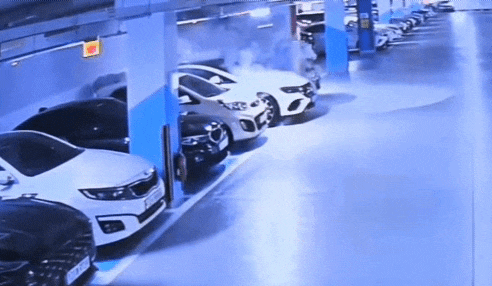A total of 24 plaintiffs launched a collective complaint to the Seoul Central District Court on Thursday against seven Mercedes sellers, including Mercedes-Benz AG, Mercedes-Benz Korea, and its official dealer, Han Sung Motor, demanding 10 million won ($7,405) each in partial compensation, according to a document summarizing the complaint.
“The amount will be expanded later after the Fair Trade Commission [FTC] concludes its ongoing investigation of Mercedes, along with up to 350 million won of compensation in exemplary damages,” said lawyer Ha Jong-son, from law firm Naru, who is handling the suit.
The complainants own or lease 22 EQE models and an EQS model, which were both disclosed to have been topped with batteries from Farasis Energy, a Chinese lesser-known battery maker that has a history of massive battery recalls due to defects.

“It’s clearly a false advertisement that a Mercedes executive had said its EQE model is installed with batteries from China’s CATL [Contemporary Amperex Technology], the world’s largest battery maker, in an interview with the local media,” Ha said.
Christoph Starzynski, vice president at Mercedes-Benz AG, said it “uses CATL batteries for EQEs,” during an interview with Dong-A Ilbo in 2022.
Media also speculated that Mercedes trained its dealers to insinuate to customers that Mercedes used CATL batteries for its EVs via internal documents distributed to them.
Ha also claimed that Mercedes was responsible for 350 million won for compensation for each plaintiff for exemplary damages they’d suffered, around five times the cost of an exchange of a battery pack, which is about 70 million won.
![As many as 880 vehicles were damaged due to a Mercedes EQE EV explosion in an underground parking lot in an apartment complex in Incheon on Aug. 1. [YONHAP]](https://koreajoongangdaily.joins.com/data/photo/2024/10/10/74ec5257-baff-4652-b041-929741ac8048.jpg)
Under Korean law, automakers or auto parts makers are obligated to “compensate customers up to five times the damages” if they are aware of flaws but purposely hide, reduce or falsify them.
“Batteries with high energy density are vulnerable to thermal runaway [an uncontrollable and self-heating state], and Farasis Energy shows off their batteries as having one of the highest levels of energy density,” Ha said. “Even knowing that, EQEs are not designed to minimize the thermal runaway.”
“Mercedes did not recall their EVs even if the defects have become certain with the EQE explosion in Incheon, which is an attempt to hide the flaws,” Ha argued.

Mercedes-Benz Korea, however, immediately issued a denial statement.
“Mercedes-Benz Korea never intended to deceive our customers to sell or in selling our EVs,” the automaker said in a statement. “The matter is currently under investigation by the FTC, and Mercedes-Benz will continue to fully cooperate with the investigation.”
The first hearing will likely take place early next year.
BY SARAH CHEA [chea.sarah@joongang.co.kr]


![Hangar images indicate North Korean advances in military drone domain Satellite photos taken on March 28, included in Beyond Parallel's report on North Korea, shows what appears to be seven new drone hangars at the Banghyon Air Base. [SCREEN CATPURE]](https://www.koreadailyus.com/wp-content/uploads/2025/04/0402-Hangar-100x70.jpg)

![Deeper-I, Efinix sign deal to develop world’s first AI-FPGA single-chip solution Ikuo Nakanishi, left, vice president of sales at Efinix and Lee Sanghun, right, CEO of Deep-I pose for a photo after signing MOU on March 26. [Provided by Deeper-I]](https://www.koreadailyus.com/wp-content/uploads/2025/04/0401-DeeperI-100x70.png)